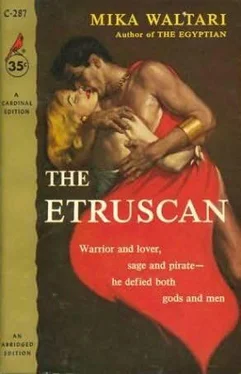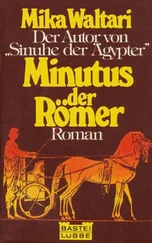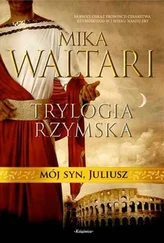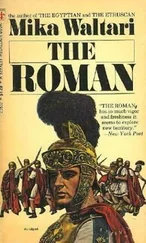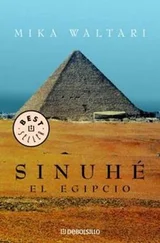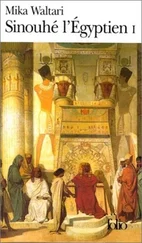Mika Waltari - The Etruscan
Здесь есть возможность читать онлайн «Mika Waltari - The Etruscan» весь текст электронной книги совершенно бесплатно (целиком полную версию без сокращений). В некоторых случаях можно слушать аудио, скачать через торрент в формате fb2 и присутствует краткое содержание. Жанр: Исторические приключения, на английском языке. Описание произведения, (предисловие) а так же отзывы посетителей доступны на портале библиотеки ЛибКат.
- Название:The Etruscan
- Автор:
- Жанр:
- Год:неизвестен
- ISBN:нет данных
- Рейтинг книги:4 / 5. Голосов: 1
-
Избранное:Добавить в избранное
- Отзывы:
-
Ваша оценка:
- 80
- 1
- 2
- 3
- 4
- 5
The Etruscan: краткое содержание, описание и аннотация
Предлагаем к чтению аннотацию, описание, краткое содержание или предисловие (зависит от того, что написал сам автор книги «The Etruscan»). Если вы не нашли необходимую информацию о книге — напишите в комментариях, мы постараемся отыскать её.
The Etruscan — читать онлайн бесплатно полную книгу (весь текст) целиком
Ниже представлен текст книги, разбитый по страницам. Система сохранения места последней прочитанной страницы, позволяет с удобством читать онлайн бесплатно книгу «The Etruscan», без необходимости каждый раз заново искать на чём Вы остановились. Поставьте закладку, и сможете в любой момент перейти на страницу, на которой закончили чтение.
Интервал:
Закладка:
Once again I related our flight and skirmishes with the Persians. Then, wearying of my narration, I said, “But you have the wax tablets wliich I brought with me. Believe them if you do not believe me.”
“We have opened and read them,” they replied. “We also have determined the facts about the Ionian events and the expedition to Sardis. It is in your favor that you do not glorify them but rather regret your part in them. Although there are fools who laud this expedition as the Hellenes’ most glorious exploit, the burning of a temple-even that of the Asian Cybele, whom we abhor-is a serious matter, for once temples begin to be burned, not even the gods of the Hellenes will be safe.”
At my request they re-read the wax tablets and permitted me also to read them. The first of the two messages began: Artemisia of the Ephesian temple of Artemis greets the holy council of Apollo’s priests at Delphi. As the clother of the virgin goddess, I am most familiar with her manifestation and her rituals and can declare that Turms of Ephesus has gained her full approval. For that reason I confidently entrust him to the protection of our divine brother Apollo. Let the oracle free him since he did no wrong but rather good. It was the goddess herself who guided his hand when he tossed the blazing torch into that accursed temple.
It then described my arrival in Ephesus and my redemption by Hera-kleitos, brother of the sacrificial king, and concluded: Live in health and do justice to the boy. He is a fair youth.
The other wax tablet began as follows: Epenides, authorized by the Council of Elders, respectfully greets the most holy oracle at Delphi and her priests. At the request of our sacrificial king we urge you righteously to condemn the blasphemer, rebel and temple-burner Turms. The burning of Sardis was the greatest calamity that could have befallen lonia.
The message concluded: We live in evil times, therefore let Turms be cast off the cliff lest he bring about still greater harm to our city than he has already. When we have been informed of his death we will be glad to send a silver tripod for the inner shrine.
Having read this malicious message which purported to defend me, I said angrily, “Do they hope to appease the Persians by cowardice? No, they are in the same boat as the other Ionian cities. No matter what my origin, I am now proud that I am not a native Ephesian.”
As soon as the words were out I became confused. The priests noticed it and asked, “What, then, is your origin?”
“Lightning struck me outside Ephesus and more than that I do not know. I was ill for months thereafter.”
Carefully weighing my words, I told them how at the age of ten I had been sent from Sybaris in Italy to Miletus for safety. When the inhabitants of Miletus heard how the men of Croton had leveled Sybaris to the ground and diverted a river to flow over the ruins, they grieved so much they clipped their hair short. But as their hair grew again, they forgot the claims of hospitality and beat me. I had been apprenticed first to a baker and then to a shepherd, until the beatings had prompted me to flee. Then, near Ephesus, the lightning had struck me.
The priests of Delphi raised their hands in dismay. “How can we solve this troublesome problem? Turms is not even a Greek name. But he cannot be an orphan, for he would not have been sent from Sybaris to safety. The four hundred families of that city were well aware of what they did. Many barbarians lived there to acquire Greek culture, but if the boy were a barbarian, why was he sent to Miletus instead of to his home?”
My self-esteem prompted me to say, “Look closely at me. Is my face that of a barbarian?”
The four old men with the divine bands of the gods around their heads studied me. “How should we know?” they asked. “Your clothes are Ionian, your education Greek. There are as many faces as there are people. An alien is not recognized by his face but by his clothes, hair, beard and speech.”
As they watched me they began to blink. Then they averted their eyes and glanced uneasily at one another, for a divine fever had permeated me after my fasting and purging, and a divine light glowed in my eyes. At that moment I saw through those four old men. So jaded were they by their knowledge that they no longer had faith in them’ selves. Something in me was more powerful than they. Something in me knew more.
Winter was near and soon the god would depart for the farthest north, for the land of lakes and swans, and Delphi would be left to Dionysus. Storms raged at sea, ships sought harbors, pilgrims no longer came to Delphi. The elders yearned for peace, shunned decisions, and looked forward only to the warmth of the braziers and the smoky drowsiness of winter.
“Old men,” I said, “give me peace and yourselves peace as well. Let us step under the open sky and wait for an omen.”
We went outside, the elders clutching their robes to them as they watched the somber sky. Suddenly the bluish feather of a dove fluttered down and I caught it in my hand.
“This is the omen!” I cried exultantly. Only later did I realize that a flock of doves had swirled to flight somewhere high above us. Still I considered the feather a sign.
The priests gathered around me. “The feather of a dove!” they marveled. “The dove is the Cythereans’ bird. Behold, Aphrodite has thrown her golden veil over him. His face is radiant!”
A sudden gust of wind caught our robes and a distant flicker of lightning touched a mountain peak to the west. The rumble of thunder echoed in the valley of Delphi.
We waited for yet another moment but when nothing more happened the priests went into the temple and left me in the anteroom. I read the maxims of the seven wise men on the wall, looked at the silver vessels of Croesus and the figure of Homer. The smell of the holy bay wood burning in the eternal fire of the altar reached my nostrils.
At last the priests returned and pronounced judgment: “You are free to go where you will, Turms of Ephesus. The gods have given their signs, the Pythia has spoken. Not your will but that of the gods is fulfilled in you. Continue to worship Artemis as you have in the past and make offerings to Aphrodite who saved your life. But the god of Delphi neither condemns you nor assumes your guilt, for that is the responsibility of Artemis, who has revolted against the Asian goddess.”
“Where am I to go?” I asked.
“Go to the West whence you once came. So says the Pythia and so say we.”
Disappointed, I asked, “Is that the god’s command?”
“Certainly not!” they cried. “Didn’t you hear that the Delphic god will have nothing to do with you? It is merely good advice.”
“I am not consecrated to Artemis,” I said, “but at the time of the full moon she has appeared to me in dreams accompanied by a black dog. In her underworld guise of Hecate she has appeared whenever I have slept in the temple on the night of the full moon at the request of the priestess. Thus I know that I shall yet be wealthy. When that happens I shall send a votive offering to this temple.”
But they rejected it, saying, “Send no offering to the Delphic god, for we will not accept it.”
They even asked the keeper of the treasury to return my money, withholding only the cost of my maintenance and purifications while a prisoner of the temple. So suspicious were they of me and of everything which at that time came from the East.
7.
I was free to leave, but Dorieus had not yet received his answer from the Delphic priests. Defiantly we left the temple grounds and spent our time by the wall, carving our names into the soft stone. There on the ground, bare, lay the natural rocks which had been worshiped as the sacred rocks of the underworld deities a thousand years before the coming of Apollo to Delphi.
Читать дальшеИнтервал:
Закладка:
Похожие книги на «The Etruscan»
Представляем Вашему вниманию похожие книги на «The Etruscan» списком для выбора. Мы отобрали схожую по названию и смыслу литературу в надежде предоставить читателям больше вариантов отыскать новые, интересные, ещё непрочитанные произведения.
Обсуждение, отзывы о книге «The Etruscan» и просто собственные мнения читателей. Оставьте ваши комментарии, напишите, что Вы думаете о произведении, его смысле или главных героях. Укажите что конкретно понравилось, а что нет, и почему Вы так считаете.
